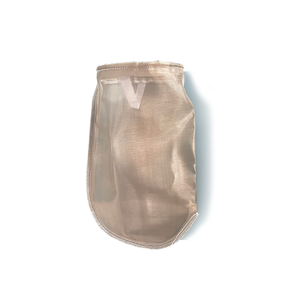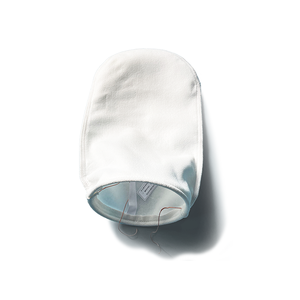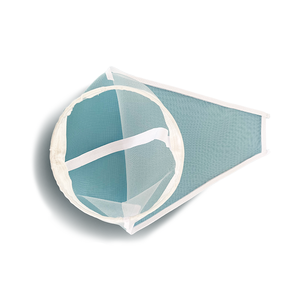
All categories
Featured selections
Trade Assurance
Buyer Central
Help Center
Get the app
Become a supplier

(1087 products available)




















fms needle felt filter bag are essential components in industrial machinery, particularly in systems requiring filtration processes. These specialized bags are designed to capture and contain solid particles from gases or liquids, ensuring efficient operation and longevity of machinery. fms needle felt filter bag are made from various materials, including synthetic fibers and natural fabrics, tailored to specific filtration needs across different industries. They play a crucial role in maintaining air and water quality, reducing environmental impact, and enhancing the performance of industrial equipment. The design and functionality of fms needle felt filter bag vary significantly, depending on the application and the type of contaminants they are meant to capture.
The diversity in fms needle felt filter bag types is vast, catering to a wide range of industrial applications. Common types include pulse jet bags, shaker bags, and reverse air bags. Pulse jet bags are known for their high-efficiency filtration and are often used in industries where continuous filtration is required. Shaker bags are utilized in batch processes where the system can be periodically shut down for cleaning. Reverse air bags are favored for their gentle cleaning action, suitable for applications with delicate filter media. Each type of fms needle felt filter bag is engineered to meet specific operational requirements, ensuring optimal performance and durability in demanding environments.
fms needle felt filter bag offer a variety of functionalities that make them indispensable in filtration systems. They provide effective separation of solids from fluids, ensuring the purity and quality of the processed material. Features such as high tensile strength, chemical resistance, and thermal stability enhance their usability in harsh industrial conditions. The design of fms needle felt filter bag often includes features like sewn-in rings or snap bands for easy installation and replacement. Additionally, their surface can be treated to repel moisture or enhance particle capture, depending on the specific needs of the application. These features make fms needle felt filter bag a vital component in maintaining the efficiency and reliability of industrial machinery.
The production of fms needle felt filter bag involves the use of various materials, each offering distinct properties to meet specific filtration needs. Common materials include polyester, polypropylene, and PTFE (polytetrafluoroethylene). Polyester is widely used for its balance of cost-effectiveness and performance, while polypropylene offers superior chemical resistance. PTFE is chosen for high-temperature applications due to its excellent thermal stability. Additives such as antistatic agents and water repellents are incorporated to enhance the functionality of fms needle felt filter bag. The choice of material impacts the bag's filtration efficiency, durability, and compatibility with different types of contaminants. As industries evolve, innovations in sustainable and eco-friendly materials are being explored to reduce environmental impact.
Proper use of fms needle felt filter bag is crucial to maximizing their benefits and ensuring optimal filtration performance. It is important to select the appropriate type of bag based on the specific contaminants and operational conditions of the machinery. Regular inspection and maintenance of fms needle felt filter bag are necessary to prevent clogging and ensure longevity. Installation should be done carefully, ensuring a secure fit to prevent leakage and loss of efficiency. In industries where filtration is critical, monitoring systems can be used to assess the performance of fms needle felt filter bag and schedule replacements proactively. Additionally, proper disposal and recycling practices should be followed to minimize environmental impact, aligning with sustainability goals in industrial operations.
Selecting the right fms needle felt filter bag requires a comprehensive understanding of the specific needs of your filtration system. Factors such as the type of contaminants, the operating environment, and the desired filtration efficiency must be considered. For instance, industries dealing with high-temperature processes may require fms needle felt filter bag made from materials like PTFE, which offer excellent thermal stability. On the other hand, applications involving chemical exposure might benefit from polypropylene fms needle felt filter bag due to their superior chemical resistance. By aligning the material and design of fms needle felt filter bag with the operational demands, you can ensure optimal performance and longevity.
The size and configuration of fms needle felt filter bag also play a critical role in their effectiveness. Depending on the equipment and the volume of material being filtered, you may need fms needle felt filter bag with specific dimensions or features such as snap bands for easy installation. Additionally, the flow rate and pressure drop across the fms needle felt filter bag should be evaluated to ensure they meet the system's requirements without compromising efficiency. Customization options, such as surface treatments to enhance particle capture or moisture repellency, can further tailor fms needle felt filter bag to meet specific application needs.
When selecting materials for fms needle felt filter bag, it's essential to consider factors such as temperature resistance, chemical compatibility, and mechanical strength. Different materials offer varying levels of performance in these areas, making it crucial to match the material properties with the specific challenges of the filtration process. For example, polyester is a cost-effective option for general-purpose filtration, while PTFE is ideal for high-temperature or chemically aggressive environments.
Extending the lifespan of fms needle felt filter bag involves regular maintenance and proper handling. Routine inspections can help identify wear or damage early, allowing for timely replacement before efficiency is compromised. Ensuring a secure fit during installation prevents leaks and potential damage. Additionally, cleaning and replacing fms needle felt filter bag according to the manufacturer's guidelines can prevent clogging and reduce stress on the filtration system.
Environmental considerations for fms needle felt filter bag include the choice of sustainable materials and proper disposal practices. As industries aim to reduce their environmental footprint, options such as recyclable or biodegradable materials are becoming more prevalent. It's important to consider the entire lifecycle of fms needle felt filter bag, from production to disposal, to minimize environmental impact. Implementing a recycling program can also help manage waste effectively.
Yes, fms needle felt filter bag can be customized to meet specific industrial needs. Customization options include selecting materials with specific properties, adjusting dimensions, and incorporating features like antistatic coatings or moisture-resistant treatments. These adaptations ensure that fms needle felt filter bag perform optimally in unique operational conditions, enhancing the overall efficiency and reliability of the filtration system.
Determining the appropriate flow rate for fms needle felt filter bag involves assessing the system's filtration requirements and the nature of the contaminants. The flow rate should allow for efficient particle capture without causing excessive pressure drop, which can strain the system. Consulting with filtration experts or referring to manufacturer specifications can provide guidance on selecting fms needle felt filter bag with the right flow rate for your application.